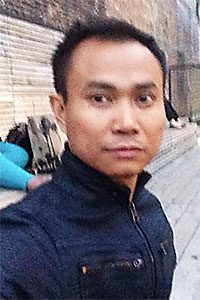
What's new? That's what my reaction was when I learnt about the plagiarism allegation levelled at Thai architect Duangrit Bunnag over the winning design for Suvarnabhumi airport's new terminal that has been ongoing over the past week.
Plagiarism has had a comfortable place in Thailand for as long as I can remember, in music, literature, design, education and even politics. Thai society's tolerance toward plagiarism has just helped foster its very existence.
So, it was not surprising to see Prime Minister Prayut Chan-o-cha -- who himself became a subject of a similar, lighter plagiarism accusation last week -- recently talking to the press about him ordering authorities to probe the design controversy without stuttering, or looking awkward or embarrassed.

Surasak Glahan is Deputy Editorial Pages Editor, Bangkok Post.
While Mr Duangrit is suspected by Thai netizens of copying the design of the Yasuhara Wooden Bridge Museum by Japanese architect Kengo Kuma, Gen Prayut was accused by ousted premier Thaksin Shinawatra, as cited by an unnamed Pheu Thai Party source, of copying his political ideas -- from executing identical populist policies to arranging "mobile cabinet meetings" in the provinces to woo support from the electorate.
Of course, the media and the public did not take the accusation against the premier seriously, mostly because many people are too fed up to discuss it. It could also be that Thaksin is the Thai media's least favourite politician, or also because plagiarism is widely accepted as a means for one to make academic or professional achievements.
One may ask: If others can get away with not giving credit where credit is due or not paying for intellectual property rights, why can't I?
The allegation against Mr Duangrit, which he has denied, has attracted wide public interest because it involves a lucrative state contract worth 329 million baht for the design of the new 35-billion-baht terminal. Otherwise, it might have just died down by now.
I have grown up in a culture in which plagiarism is not only tolerated but rewarded, so I don't wonder why the vicious cycle keeps repeating itself.
During my teen years, it was common for local musicians and their music labels to earn a fortune from many songs whose music was originally composed by Western or Chinese musicians, such as Wham!'s Last Christmas or The Bangles' Eternal Flame. They simply copied the music, using the exact same chords, and added lyrics in Thai, leading the songs to become popular.
A few decades later, this practice still thrives in the music industry.
In literature, there is no difference. Several famous published novels have been criticised for plagiarising the original works of Western authors. Even the late former PM Kukrit Pramoj, a prominent writer, is accused of plagiarism by critics in a number of his books. For example, Blackbirds at Bangpleng is his novel seen as closely mirroring The Midwich Cuckoos by John Wyndham, which was adapted into the film, Village of the Damned.
The worst thing is that it even occurs in academia, which should be a place that nurtures learning and innovation. In just the past decade, there have been cases of Thai postgraduates, PhD students and academics copying dissertations. The most controversial case occurred in 2012 when Supachai Lorlowhakarn, the director of Thailand's National Innovation Agency, had his PhD revoked for plagiarising 80% of his thesis from the work of Wyn Ellis, a British researcher.
Don't get me wrong. There are many Thai musicians, writers, artists, architects and politicians who are recognised for their originality. But the parallel existence of plagiarism has not fostered much innovation, a key goal of the government's Thailand 4.0 economic model.
Apart from the tolerance of plagiarism, our own education system may have nurtured this practice. Rote learning that emphasises memorisation along with a hierarchical classroom environment where students are not expected to challenge their teachers may have discouraged learners from developing critical thinking and creativity. As a result, we have many graduates who possess knowledge and technical skills but lack innovation.
Apart from promoting zero tolerance of plagiarism, we need to foster a culture in which people are given credit where credit is due. Given that our prime minister still has not credited anyone for the policy platform for which he has been accused of plagiarism, the Thailand 4.0 era may end up stuck in an innovation cul-de-sac.
